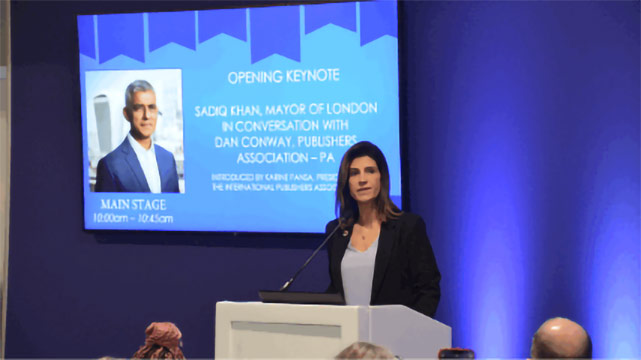Pansa welcomed Khan and his commitment to both London as an international level cultural hub and a more environmentally respectful city. She underlined the dual nature of publishing in tackling the climate crisis – through the books it publishes and the way publishers conduct themselves as businesses. Khan, speaking in conversation with Dan Conway, CEO of the Publishers Association, was keen to underline the need for urgent actions and that Mayors of cities in many countries could be ‘doers’. He spoke of his forthcoming book as a sort of guidebook to move from fatalism and apathy to a action focused approach.
Sustainability was on the Main Stage programming with Sustainability in Books Publishing – What has Been Achieved to Date and What Still Needs to be Done? Back at the Sustainability lounge, there was an update on the progress of the 2030 Accelerator – an initiative of multiple individual publishers and service providers looking to make concrete progress on a number of sustainability issues by June this year. Jörg Engelstädter summarised the session as sharing ideas about the sustainability impact of a book. No two books are the same and not every book is a sustainably produced book.
The Copyright highlight of the day was the prestigious Charles Clark Memorial Lecture. A cooperation between the IPA, FEP, the Publishers Association, the CLA and PLS, the lecture celebrates the memory of the brilliant Charles Clark who spent much of his career focusing his critical mind on the intersection of copyright and technology.
This year’s lecture was delivered by Dr Andres Guadamuz. In a fascinating (if Llama infested) lecture, Dr Guadamuz had the opportunity to evoke the work of Charles Clark when considering different copyright regimes around the world, noting Clark’s involvement in the development of the CDPA (1988). In his self-deprecating style as an AI TDM Copyright geek whose underground band just became famous, he focused on the questions around authors, authorship and what works can be protected. He shared his belief that licensing would be the solution to limiting litigation, particular around the content used to train AI systems, although he recognized that case law in different jurisdictions could impact that. It was a thoroughly successful lecture and Q&A to a standing room only Focus Theatre.
Day 3 will see the announcement of IPA’s 2023 Prix Voltaire shortlist as part of a fascinating freedom to publish session on SLAPPs (strategic litigation against public participation). That session features HarperCollins UK discussing their libel battles over Kleptopia and Putin’s People before looking at the international context and examples from Thailand and Slovenia.

